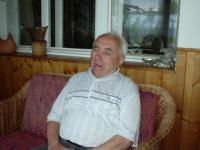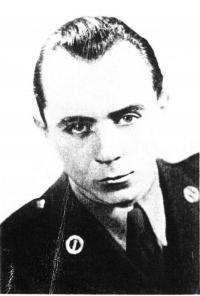(Where you in Czechoslovakia in the pre-war times?) "No, I wasn't. I never even saw my homeland, only..." (So the first time was after 1945?) "That's right. I must say that people really welcomed us. Those people shared their last slice of bread with us, because they didn't have much themselves, but they shared. I remember when we arrived at Velká Polom, we took a detour to Opava, that's this big chasm, with bridges there, and then a forest. So I drove up to this house and I said: 'Shoot in that direction boys, I'm going to get some food.' Look for food, because you didn't get rations there. Sometimes when you went back to the rear of the army, you would get some rations, but not at the front. So I tried to open the door, but it was locked. The windows were broken in, so I jumped inside. I was searching about, and I said to myself: according to experience, everyone hides everything in the cellar. So I went down to the cellar. I went slowly. I heard voices, so I took out my pistol, because sometimes you had soldiers hiding away aswell, in the cellars. Slowly I opened the door. There were some fifteen people there and two small children, crying. I opened the door and everyone went silent. I had black patched up SS trousers and a patched up Czechoslovak coat. You can imagine, the main thing was to keep warm. And there was this older person there, he was probably in the legions, and he knew word or two of Russian. He saw I wasn't a German, he saw that straight away." (Where those Czechs?) "Yeah, Czechs. And when they started speaking to me, then I said in Czech: 'Please, do you have some food?' And they all burst into tears, started to hug me. And they shared even that little what they had left. So I took a piece, and I said: 'I have my boys upstairs.' As in my friends. So they gave me some more, put a lump of bread into each of my hands, just what they had. And they were sharing the last of what they had. They didn't have it easy, those people. Well, war isn't good."


